Products
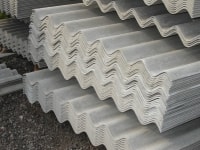
-
Fibre Cement Roofing Sheets are commonly known as Asbestos Cement (AC) Sheets. Fibre cement is a composite building and construction material, used mainly in roofing and facade products because of its strength and durability. Fibre cement products have found a wide usage in various sectors of construction: industrial, agricultural, domestic and residential buildings, mainly in roofing and cladding applications, for new constructions and refurbishment projects.
Features of Fibre Cement Roofing Sheets: Non-corrosive, Durable, Fire retardant, All-weather resistant, More sound resistant, Acid-rain resistant, Cooler during summers, Retains heat in winters, and Improves the aesthetics.
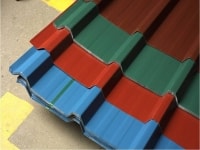
-
Colour Coated Steel Sheets are made from Pre Painted Galvanised Steel (PPGI) and Pre Pained Galvalume Steel (PPGL). The base metal used for PPGI and PPGL is cold rolled (CR) steel. Metallic coatings on CR Steel shall be either Zinc coating (Galvanising) or Aluminium-Zinc coating (Galvalume coating) through continuous hot dip process which gives GALVANIC and BARRIER protection against corrosion, giving an aesthetic appearance and long durable life under extreme weather conditions. These materials are suitable to meet design and structural requirements of steel buildings.
Features of Colour Coated Steel Sheets: Light Weight, High Strength Steel, Eco Friendly, No Health Hazards, High Temperature Resistance, Better Thermal Reflectivity, and High Corrosion Resistance.
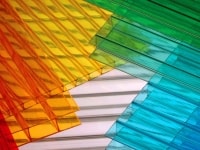
-
Polycarbonate is an extremely versatile material. Polycarbonates used in engineering are strong, tough materials, and some grades are optically transparent. They are easily worked, molded, and thermoformed. Because of these properties, Polycarbonates are used in many applications in which thermal insulation is necessary while still allowing light transmittance. Green houses, window replacements, shower enclosures, partitions, light covers, patio covers, carports, and windbreaks are all modern applications for Polycarbonate Sheets.
Features of Polycarbonate Sheets: Significantly Lighter than glass, Stronger than glass, more Flexible, more Impact Resistant, Temperature Resistant, and varying Optical Properties such as Transparency.
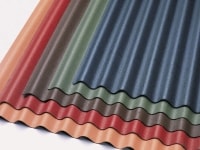
-
Asphlatic roofing sheets are made from Bitumen and waste paper. These have been developed as a replacement or a substitute for thatched roof. Asphaltic roofing sheets possess good insulation properties and are available comparatively at cheaper cost. The sheets can be adopted in hot and humid regions as well as cold and hilly areas.
Features of Asphlatic Roofing Sheets: High tensile strength, Durability, Sturdy construction, Unbreakable, No Asbestos, High Insulation, High Sound Absorbency, and No Rusting.
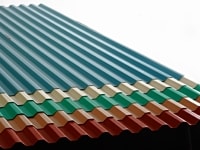
-
Polyvinyl Chloride, commonly abbreviated as PVC or mentioned as Poly is the third-most widely produced synthetic plastic polymer. PVC roofing sheets are perfect for general purpose roofing and cladding jobs. These are budget friendly and easy to install. These translucent PVC sheets look great and allow a lot of light in from above, brightening up the space below. These roof sheets are easy to cut, drill and install with standard Do-It-Yourself tools.
Features of PVC Roofing Sheets: Light in weight, Highly durable, Excellent chemical resistance, Excellent corrosion resistance, Excellent impact strength, High rigidity, Superior strength, Reliable electrical insulation, and Low flammability.
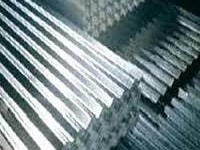
-
Galvanised Corrugated Sheets, more commonly known as GC Sheets, are basically Galvanised Iron (GI) sheets. These are steel sheets which are coated with Zinc and include a range of hot dip galvanised and electro-galvanised steel sheets. Zinc weathers at a very slow rate, so the coating generally has a long life. Thus, Zinc provides sacrificial protection to steel. GC Sheets prove to be a cost effective solution for various construction purposes such as roofing, side-walls, partitions, and panels.
Features of GC Sheets: All-weather proof, Complete protection, Automatic protection for damaged areas, Long life, Reliability, Light Weight, High Strength, Convenient to install, and Maintenance free.
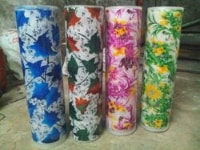
-
Polypropylene Sheets, commonly known as PP sheets or Poly Plast sheets or Poly Plastic sheets or simply as Plastic sheets, as the name suggests are made out of thermoplastic polymer. Polypropylene is noted for its excellent chemical resistance in corrosive environments. These sheets are available from various manufacturers in various widths, thicknesses, and other specifications such as colours ranges, textures and surface effects to meet the varying demands of clients.
Features of Polypropylene Sheets: Excellent impact resistance, Good abrasion resistance, Good electrical insulation, Lightweight, Excellent chemical resistance, and Excellent corrosion resistance.
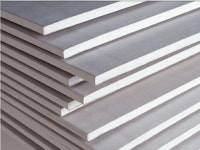
-
Fibre Cement Boards are autoclaved cellulose fibre cement boards which are 100% free from asbestos. These boards are composite material made of sand, cement and cellulose fibre. The cement core makes them water resistant and these boards can retain their strength even in a wet state. Fibre Cement Boards are alternative for similar products made from vinyl, polyvinyl chloride, wood composite, and aluminium. These boards are ideal material for today's construction industry, which is increasingly inclined towards speedy and innovative designs.
Features of Fibre Cement Boards: Weather resistant, Immune to water damage, Fire resistant, Provides sound insulation, Shatter resistant, Low shrinkage, and Termite resistant.
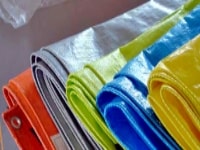
-
Tarpaulins, also known as Tarps, are large sheets of strong, flexible, water-resistant or waterproof materials. These materials are often cloths such as canvases or polyesters coated with urethane, or plastics such as polyethylene. Tarpaulins often have reinforced grommets at the corners and along the sides to form attachment points for rope, allowing them to be tied down or suspended. Tarpaulins are mostly used for protecting goods, live stocks, and vegetation from direct sunlight and rainfall, and for providing temporary shelters.
Features of Tarpaulins: Durability, Reliability, Eye catching colours, Excellent finish, High tensile strength, Moisture resistant, Temperature resistant, Dust resistant, and Weather resistant.
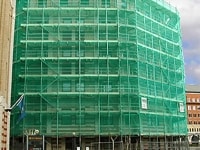
-
Shade Nets, used as Scaffolding Nets, Debris Nets, Construction Nets, Garden Nets, Insect Nets, or Allotment Nets, are lightweight High Density Polyethylene (HDPE) nets designed to protect workers and pedestrians walking near the base of a scaffolding structure. These nets, allow air circulation and considerably reduce rain and wind penetration which improves the working environment for construction personnel. They are economical alternatives to other expensive plastic enclosure systems when it is not necessary to completely isolate work areas from inclement weather.
Features of Shade Nets: Strong, Durable, Light weight, Tear Resistant, Fungus Resistant, Moisture Resistant, Capable of Bearing Loads, and Ease of Installation.
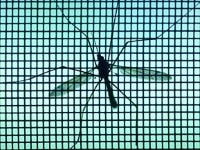
-
Insect Screens, commonly known as Mosquito Screens/Nets, let you enjoy fresh air and light without any insects. These screens provide safety against mosquitoes and other insects without using any harmful chemicals and gases. The Aesthetic Design, Fine Material, Skilled Workmanship, Environment Friendly and Perfect Fit coupled with reasonable pricing, quick instillation and easy maintenance make these insect screens a truly attractive product for Houses, Hospitals, Colleges, Resorts, Food Processing Units, Factories, and Offices.
Features of Insect Screens: 100% Insect Protection, Do not Obstruct Views, Free Flow of Air, Eco Friendly, Durable, Easy Care, Easy Cleaning, and Best Value for Money.
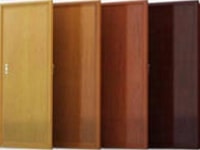
-
Polyvinyl Chloride (PVC) has proven itself to be one of the strongest and the most useful materials in the modern world. Because of their unique chemical structure, PVC doors and door frames provide better insulation and therefore better energy efficiency than traditional timber doors and door frames. While timber doors and door frames will warp or shrink or expand over time, PVC doors and door frames remain perfectly stable because they are 100% waterproof. They are also virtually maintenance free and never require stripping or repainting. While other types of materials fade or discolour when exposed to direct sunlight, PVC is highly UltraViolet (UV) resistant and remains looking new throughout the life of doors and door frames.
Features of PVC Doors: Water Proof, Termite Proof, Fire Retardant, Maintenance Free, Better Insulation, Durable, and Long Lasting.
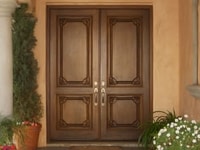
-
Wooden Doors can provide the distinct touch to your houses and offices. Wood enhances your surroundings by bringing warmth, spirituality, and connection to mother nature into your living spaces. Wood is a renewable resource. Using wood from sustainably managed forests helps protect the environment. Wood is a durable material that can last for generations. Wood is versatile that enables to maintain traditional looks or to create modern sleek designs.
Features of Wooden Doors: Elegant look, Unique Designs, Highly customizable, Made from Natural Resources, Limited chemical use, Better Insulation, and Durable.
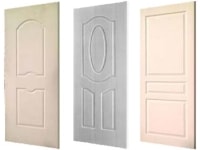
-
Fibre-Reinforced Plastic (FRP), is a composite material made of a polymer matrix reinforced with fibres. FRP doors are more popular than ordinary doors because FRP doors are 100% waterproof, weather proof and have longer life span of about 25 years. These doors are free from swelling, warping or splitting and have good impact resistance. FRP doors have a significantly lower coefficient of thermal expansion compared to that of PVC and Wooden Doors, allowing doors and frames to be manufactured to a tight tolerance.
Features of FRP Doors: 100% Water Proof, 100% Weather Resistant, 100% Termite Proof, Strong, Durable, Fire Retardant, Scratch Resistant, Highly Economical, Maintenance Free, and Available in various colors and finishes.
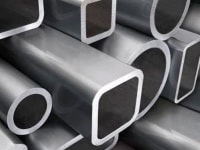
-
Mild Steel (MS) is the most common form of steel widely used because its price is relatively low and its material properties are acceptable for many applications. Low Carbon content in MS makes it malleable and ductile. Pipes and Tubes manufactured using MS can be easily welded and formed in various shapes and sizes for pipelining and tubing projects. MS Pipes and MS Tubes are used in various Structural (e.g., Shed, Scaffolding), Industrial (e.g., Tools, Poles), Automobiles (e.g., Chassis) and Domestic (Stairs, Fencing, Racks) applications.
Features of MS Pipes: Light weight, Dimensional accuracy, and Anti corrosive.
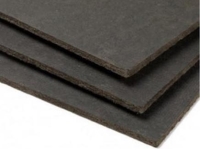
-
Expansion Joint Filler (EJF) Boards are soft fibre boards impregnated with bituminous material to render them durable and waterproof. These boards are compressible and possess high degree of recovery after compression load is released, thereby ensuring that no free space exists in between joint space. They are used in concrete, brick, block work and isolation joints where readily compressible low load transfer joint filler is required. EJB boards are commonly used in buildings, basements, interconnecting walkways between buildings, parking lots of buildings, roads, and so forth.
Features of EJF Boards: Superior compression and recovery properties, Durability, Chemical resistance, Excellent weatherability and Economical.
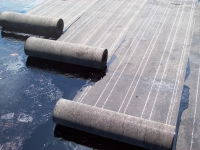
-
Tar Felts are also known as Bituminous Rolls. Bitumen (Asphalt or Coal tar) is a mixed substance made up of organic liquids that are highly sticky, viscous, and waterproof. Felt is an unwoven fabric that is produced by matting fibres under pressure. Felt rolls coated with bitumen become Tar Felts or Bitumious Rolls. These rolls are designed to protect residential and commercial buildings especially in Terraces and Basements where Water-proofing is required and in roofs where Damp-proofing is required.
Features of Tar Felts: Tough, Durable, Cost effective, Less prone to damage.
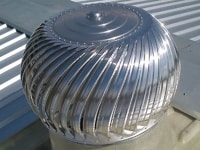
-
Roof Turbine Ventilators, more commonly known as Turbine Air Ventilators or Wind Turbine Ventilators, as the name implies, are ventilators placed on top of the industrial sheds and are powered by the wind to create effective ventilation, thereby, bringing out a drop in temperature in the sheds and allow supply of fresh air through doors and windows. Turbine ventilators are round metal vents with fins in them. A little bit of wind is just enough for the turbine ventilator to rotate. The faster the wind, the faster the turbine will rotate and exhaust the heat, smoke, fumes, humidity, and so forth.
Features of Roof Turbine Ventilators: Use of renewable source of wind energy. Runs on free wind power hence zero running power cost. Increased life of roofing sheets in the industrial sheds. Reduction in maintenance of plant and machinery due to reduced humidity level.
